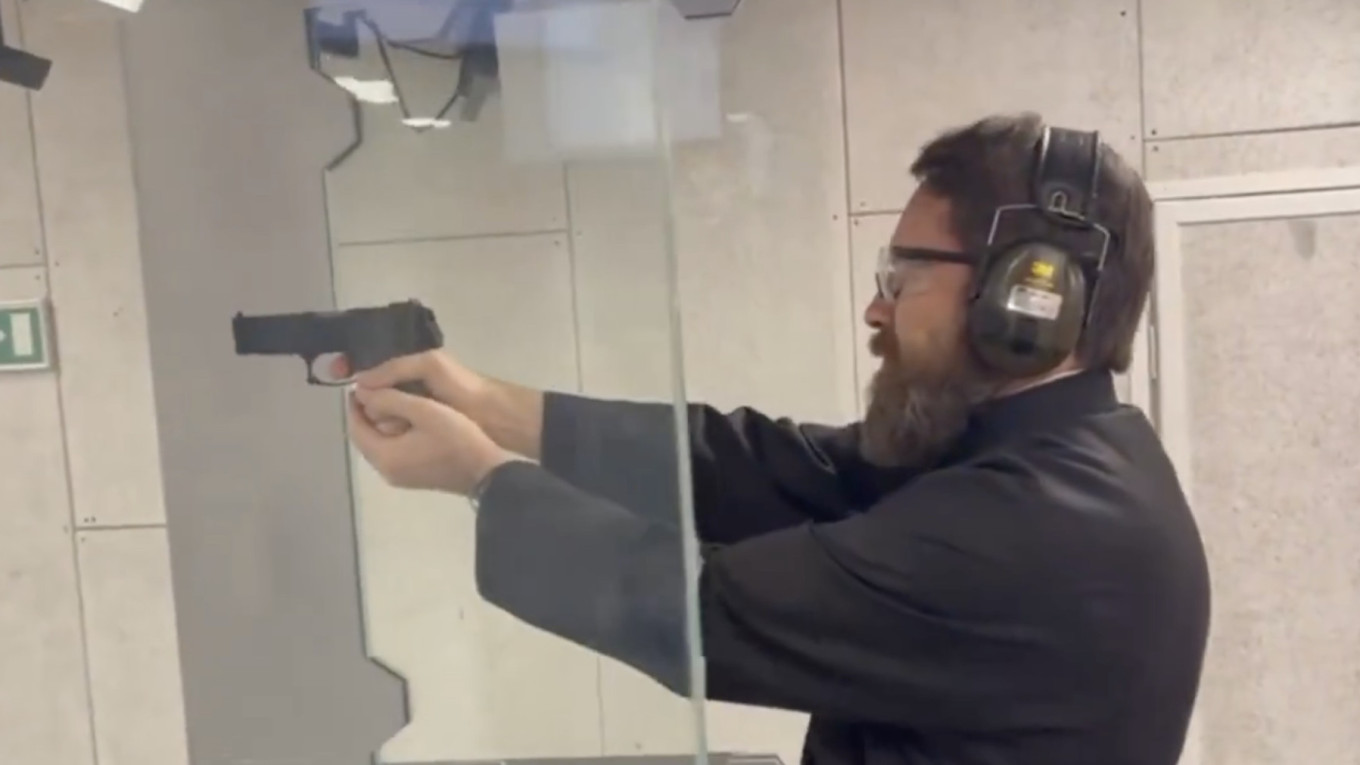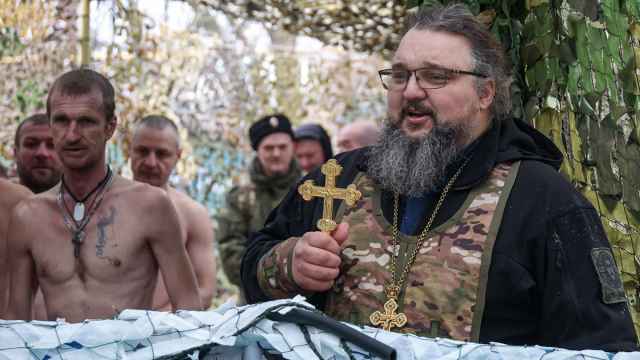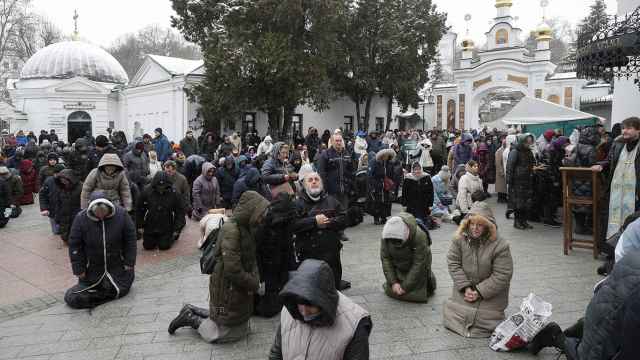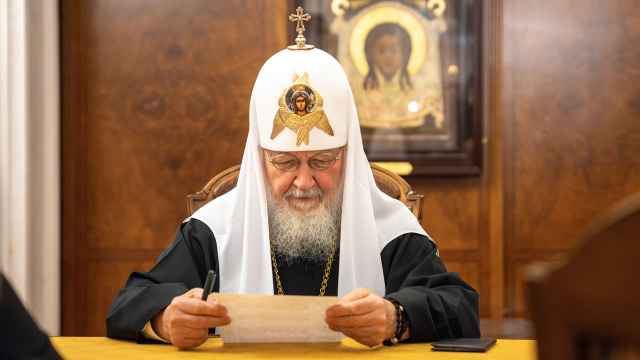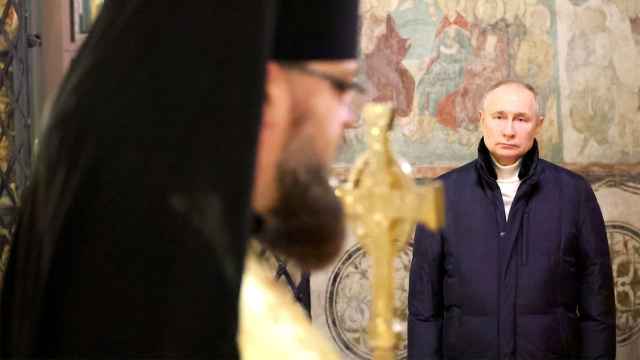A video of a bearded man wearing headphones and repeatedly firing a pistol at a shooting range recently triggered a frenzy on social media. The man in question is Metropolitan Hilarion, at one time the second-ranking cleric in the Russian Orthodox Church.
According to the Hungarian and Czech journalists who published the clip, the shooting gallery is inside the Lubyanka, the Moscow headquarters of the FSB. They claim the footage points to the bishop’s ties to Russia’s secret services.
While I can’t confirm the location, it is arguably not a great look for a senior Russian cleric to be seen firing a gun— even for fun — nearly four years into a war in which people are dying every day. But, as the world now knows, Patriarch Kirill, the head of the Church, did not call for peace when Moscow launched the full-scale invasion of Ukraine. Early on, he blamed the conflict on Europe’s gay pride parades, suggesting that the pro-Russian Donbas was paying the price for its “fundamental rejection” of such degenerate Western values.
His position has not wavered since. Eight months later, he told conscripts and contract soldiers sent to kill Ukrainians that if they fell on the battlefield, they would be washed of their sins. By 2024, he was calling Vladimir Putin’s land grab a “Holy War.”
In my book, “The Baton and The Cross,” I explore how the Church shaped Putin’s Russia — and the part it has played in enabling the current bloodshed. I also demonstrate how, throughout its 1,000-year history, the Church has always sat at the right hand of power and done whatever it takes to ensure its survival, its influence and its own enrichment. The cases of opportunism and overreach today echo those from the past — and the story of Hilarion is no exception.
Until the full-scale invasion, he was part of Kirill’s inner circle and had a stellar career. Born Grigory Alfeyev, he studied music before he left to become a monk and took the name Hilarion. He has composed choral works and written a slew of theological books. From 2009, he was Metropolitan of Volokolamsk and headed the Moscow Patriarchate’s version of the foreign ministry. He was also a member of the Holy Synod and rector of the theological studies center named after Saints Cyril and Methodius. Some saw him as the Patriarch’s successor.
But in June 2022, Kirill suddenly turned against his heir apparent. Hilarion was dismissed from all his positions and appointed Metropolitan of Budapest — a job he had held two decades as a junior cleric. No reason was given and, unusually, not even perfunctory thanks were recorded for his services over the years. According to Church insiders, the only remark the Patriarch made was succinct: “Tak nado” — This had to be done.
Hilarion was no rebel and he was not one of the 233 Russian clerics who signed an open letter calling for an immediate ceasefire. Though he never criticized the war, he did not endorse it either. Before leaving Moscow, he served his final liturgy at his church. He told parishioners the Holy Synod’s decision was “required by the current socio-political situation,” and not due to any professional failings. “The road took a very sharp turn,” he said. “I didn’t keep my eye on it and ended up on the hard shoulder.”
When I met Hilarion in Budapest the following year, he was blunter. He told me he suspected the Patriarch had spared him from being “simply exterminated.” Whether he truly feared for his life is unclear — the climate of fear in the church is real.
At the same time, he was not keeping a low profile. The day after we met, Pope Francis was visiting Hungary and was photographed kissing Hilarion’s pectoral cross. Far from being ostracized, the bishop still appeared to be acting as Kirill’s right-hand man and running errands for the Kremlin. Even if Hungary is a backwater in Orthodox terms, politically it is a staunch Putin ally. Its leader, Viktor Orbán, has stalled EU sanctions on Russia and obstructed Western support for Ukraine. In September 2022, his deputy, Zsolt Semjén, received a Patriarchal Order of Glory and Honor from Moscow — just months after Hungary insisted Kirill be removed from the EU sanctions list.
The bishop soon received Hungarian citizenship, enabling him to travel unaffected by international sanctions. Hilarion’s former subdeacon, a Russian Japanese student of Orthodoxy, Georgiy Suzuki leaked a photo of his passport. Not long before, Suzuki had fled to Japan, accusing the bishop of sexual harassment and posting online a covert recording he had made of his boss’s unwanted presence in his bedroom. In one grainy video, a man who bears a strong resemblance to Hilarion, can be seen stripping down to his underwear and getting into a bed in which Suzuki was sleeping. Coincidentally, Hilarion backed the expansion of Russia’s notorious “gay propaganda” law and criticized Pope Francis for allowing Catholic priests to bless same-sex couples. When the young assistant complained, he said Hilarion warned him that “nothing would work out” for him if he chose to leave his employment.
Yet Suzuki did leave, taking cash and property from the residence, as well as a stash of photographs and videos of the bishop’s yachting and skiing trips. Footage emerged of Hilarion on an electric scooter whizzing down the marble corridor of his 14-room mansion on the outskirts of Budapest, a property he said he paid for himself with the royalties he received for his theological works and choral compositions. He prided himself on his contacts with the rich and powerful and boasted to his assistant about the conversations he had with Hungarian officials, including ways in which Hungary could help Russian businessmen with residence permits or lobbying to lift sanctions.
In return, according to Suzuki and the Russian exile news site, The Insider, Hilarion received cash from Russian oligarchs in various locations abroad such as Dubai, Sardinia or Israel. “Some businessmen assumed they were donating to a church charity,” said Suzuki.
Although eleven priests of the Budapest diocese rallied around Hilarion, calling him a “saint,” he was recalled to Moscow and later assigned to parish work in at the resort town of Karlovy Vary in the Czech Republic. The Synod said Hilarion’s retirement as a bishop was prompted by “the discrepancy between the nature of his relationships with his immediate circle and the conduct expected of a monk and clergyman.” Hilarion said he accepted the decision with “humility and gratitude” and would now try to “correct shortcomings” in his personal life. Yet he denied the allegations of sexual misconduct, insisting he is the victim of a smear campaign orchestrated by Suzuki along with “foreign-agent media outlets, defrocked former clergy, members of extremist groups, and experts who have left Russia and specialize in denigrating the Russian Church."
The Church presents itself as a guardian of traditional values — but applies them selectively. The Orthodox oligarch Konstantin Malofeyev has long bankrolled outfits such as the World Congress of Families, which opposes divorce, gay rights and abortion, while supporting a society built on “the voluntary union of a man and a woman in a lifelong covenant of marriage.”
Yet he left his wife after 20 years for Maria Lvova-Belova, who stands accused by the International Criminal Court of deporting Ukrainian children. The husband Lvova-Belova dumped for the billionaire was himself an Orthodox priest.
Though the Church publicly condemns homosexuality, same-sex relationships among its clerics flourish behind closed doors. An archpriest now living abroad confessed to the head of his diocese that he was gay and felt he had to leave the Church. The bishop told him not to worry. “Live apart from your wife and continue your service,” he said, adding, “But if you cause a scandal, I will destroy you.”
This double game suits Russia’s intelligence services. The more frightened people are about any of their shortcomings reaching the public domain, the more susceptible they are to kompromat with the Church hierarchy and the FSB working hand in hand. Significantly, a year into the full-scale war, the FBI declassified several documents, including a confidential 2009 memorandum revealing that one of Kirill's first initiatives as Patriarch was to systematically rebuild and formalize cooperation with Russian intelligence services. This was a calculated move by the new head of the Church, who had Soviet intelligence ties under the code name “Mikhailov.”
Hilarion’s presence at a shooting range proves little even if the gun he was holding has been identified as a standard-issue sidearm for Russia’s FSB and military. But the Czech government has concerns about the Karlovy Vary church where he now serves. The former dean of the St. Peter and Paul parish, was expelled from the country last year for national security reasons. He was accused of spreading propaganda against Ukraine and the West and of praising Patriarch Kirill in his sermons. The Czech Foreign Minister Jan Lipavský described the church as “part of the Kremlin’s machinery.”
There are now calls to sanction Hilarion, although it is not clear if the incoming populist Czech government will impose any. As for the Metropolitan, he rejects the accusations against him and his church: "Tourists and pilgrims visit the church every day. It's a vibrant and active center of spiritual life.”
But the hypocrisy of the Church hierarchy has repelled many believers. They feel that behind the solemn liturgy and the prayers, there is a moral vacuum in their church. After all, the Patriarch’s pitiless aggression towards Ukraine flouts Christ’s second-most important commandment: after loving God, to love thy neighbor as thyself.
A Message from The Moscow Times:
Dear readers,
We are facing unprecedented challenges. Russia's Prosecutor General's Office has designated The Moscow Times as an "undesirable" organization, criminalizing our work and putting our staff at risk of prosecution. This follows our earlier unjust labeling as a "foreign agent."
These actions are direct attempts to silence independent journalism in Russia. The authorities claim our work "discredits the decisions of the Russian leadership." We see things differently: we strive to provide accurate, unbiased reporting on Russia.
We, the journalists of The Moscow Times, refuse to be silenced. But to continue our work, we need your help.
Your support, no matter how small, makes a world of difference. If you can, please support us monthly starting from just $2. It's quick to set up, and every contribution makes a significant impact.
By supporting The Moscow Times, you're defending open, independent journalism in the face of repression. Thank you for standing with us.
Remind me later.



